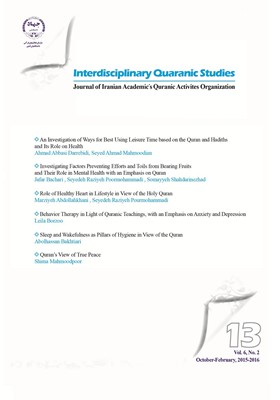Sleep and Wakefulness as Pillars of Hygiene in View of the Quran
Subject Areas : Quran and Sciology
1 -
Keywords: : Hifz-ul-Sihha (hygiene, maintaining health), Quran, Sleep and Wakefulness ,
Abstract :
Health is a divine blessing and it is everyone’s obligation to maintain health. The Holy Quran considers the life of one human being as equal to the life of all humanity, which signifies how important it is for every human being to maintain his or her health. It is also a confirmation of what has been narrated from Imam Ali (AS), “Two blessings are unrecognized: security and healthy. Humankind will recognize their worth once they are gone.” Ibn Sina (Avicenna), the renowned Iranian Muslim physician who believes he is indebted for his knowledge to his Tawakkul (putting his trust) in the main physician of the world, namely God, and to his recourse to Ahl-ul-Bayt (AS), considers the main part of Hifz-ul-Sihha (hygiene, maintaining health) to be physical exercise, eating, drinking and measures related to sleeping. Today, in modern medicine, the growing trend of sleep disorders has turned into a fundamental problem and that necessitates knowing the Quran’s view about it. It seems unlikely that the Quran, a book that is the savior of human beings and their guide in all times, remain silent on the important issue of sleep and wakefulness. This paper has been conducted using a descriptive-analytical method and studying physiological sources and books on Hadith and Tafsir (Quran interpretation), including Nemuneh Exegesis of the Quran. It concluded that based on the first category verses of the Quran, the main time for sleep is at night, in accordance with the body’s rhythm and biological clock. Fundamentally, God has specified night for rest and day for activities. But in the second category of verses, the Quran exactly defines the span of sleep in the duration of the day and night: from after Isha prayers (a little after midnight as defined in Islamic Sharia) until the Adhan of morning or dawn. This can be inferred from verse 11 of Surah Maryam. It is hoped that human beings, especially Muslims, pay attention to and act upon the teachings of the Quran more than before, and here the role of the media, religious preachers and those promoting hygiene is important for spreading the Quranic teachings.
قرآن کریم#
آیت الهی، سیدمحمدتقی (1370).کلیات بهداشت اسلامی، تهران: معاونت امور فرهنگی وزارت بهداشت، درمان وآموزش پزشکی.#
بختیاری، ابوالحسن.(1394). لبخند زیبا، قم: سپهرنوین.#
تابعی، سیدضیاءالدین(1386). «اسرار بیولوژیک اوقات عبادت»،طب وتزکیه، ش 66-67.#
جزائری، سید علی (1904). التحفه السنیة، اصفهان: مؤسسه تحقیقات رایانه¬ای قائمیه.#
جوان، عبدالرسول(1386). مقایسه شیوع اختلالات خواب در بیماران مبتلا به سکته قلبی حاد با همراهان سالم آنان، بی¬جا: مجله ارمغان دانش،12(2).#
حیدری، اژدر (1380). «اثرات یک شب محرومیت از خواب بر سطح هورمونی و کارآیی عملکرد»، طب نظامی، ش 3.#
سلطانی، شاهین (1391). «اصلاح خواب و بیداری در سنین و مناطق جغرافیایی مختلف از دیدگاه طب سنتی اسلام و ایران»، شماره سوم.#
عباس نژاد، محسن (1390). قرآن وطب، تهران: بنیادپژوهش¬های قرآنی دانشگاه وحوزه.#
علائی، حجت الله (1380). «ارزیابی اثرات سیستم سروتوژنیک بر زمان خواب در روایات»، اصفهان: مجله دانشکده پزشکی.#
مکارم شیرازی، ناصر (1387). تفسیر نمونه، تهران: دارالکتب الاسلامیة.#
هدایتی، حمیدرضا (2014). «سته ضروریه حفظ الصحه ناصری ردیابی از پزشکی پیشگیری در پزشکی دیرپای ایران»، RHM.- 17.#

